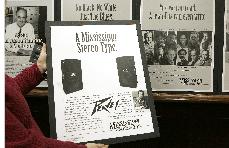Mississippi agency attempts to erase state’s stereotypes

December 5, 2006
JACKSON, Miss. – For Mississippian Rick Looser, the last straw came on an airline flight a couple of years ago when the 12-year-old Connecticut boy next to him asked: “Do you still see the KKK on the streets every day?”
That is what prompted the advertising executive to spend his own money on a campaign to dispel Mississippi’s image as a forlorn state of poor, illiterate, racist good ole boys.
“Mississippi has more black elected officials than any other state in the country,” Looser said. “The old stereotype of the short, fat, white, bald men in suits smoking cigars just doesn’t carry weight.”
Looser’s campaign – “Mississippi, Believe It!” – doesn’t shy from the fact that the state has a segregationist past, or that national studies consistently put it near the bottom in education and the top in poverty and obesity. Through a Web site, posters, T-shirts and other merchandise, it seeks to show another side.
One of the slogans – “No Black. No White. Just the Blues.” – points out that the state is the birthplace of the blues and home to such greats as B.B. King, Bo Diddley and Muddy Waters.
Get The Daily Illini in your inbox!
Another says, “In Mississippi, We Always Have Our Hand Out. But It’s Usually to Give, Not Receive,” pointing out that for eight years in a row Mississippians have given more per capita to charity in relation to income than residents of any other state.
The debate came to the forefront last month when Rep. Charles Rangel, D-N.Y. said to The New York Times: “Mississippi gets more than their fair share back in federal money, but who the hell wants to live in Mississippi?” He apologized days later.
Looser plans to send Rangel a shirt with the slogan: “Yes, we can read and a few of us can even write,” part of a campaign to highlight the state’s literary giants such as William Faulkner, Eudora Welty, Tennessee Williams and John Grisham.
“If he is truly sorry, we want his staff to take a picture of him in the shirt and send it to us,” Looser said. “That will close the chapter on his apology.”
Looser has spent about $300,000 on the year-old campaign.
Looser, president of The Cirlot Agency in suburban Jackson, said the biggest stumbling block remains Mississippi’s turbulent racial history. Several of his ads meet this head-on, including one about the state’s status in electing blacks. The slogan? “Meet a Few of Our New `Good Ole Boys.'”
Mark Potok, director of the Southern Poverty Law Center’s Intelligence Project, which monitors hate groups, agreed that Mississippi doesn’t always deserve such a bad rap.
“People think that the Klan and white supremacist groups in general are Southern artifacts, but that simply is not the truth,” Potok said.






